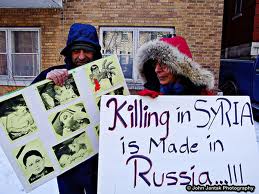 Several U.N. Security Council members said they were close to a deal on Thursday on the wording of a draft resolution backing an Arab League plan for Syrian President Bashar al-Assad to step aside, but it was unclear if Russia would agree to it.
Several U.N. Security Council members said they were close to a deal on Thursday on the wording of a draft resolution backing an Arab League plan for Syrian President Bashar al-Assad to step aside, but it was unclear if Russia would agree to it.
Pakistan’s U.N. Ambassador Abdullah Hussain Haroon told reporters that the 15-nation council was “two words away” from an agreement on an amended version of a European-Arab draft resolution circulated to the council by Morocco.
“I think we’re very close,” he told reporters ahead of a closed-door council meeting to discuss the new draft. “I hope today that we can arrive at a unanimous resolution.”
French Ambassador Gerard Araud said he hoped the council could agree on a final draft on Thursday that would be put to a vote on Friday, Saturday or Monday at the latest.
But U.S. Ambassador Susan Rice, asked if she agreed with Haroon’s assessment, suggested that it might be too optimistic. “That’s not my impression,” she said.
Togo’s U.N. envoy Kodjo Menan, president of the Security Council this month, told reporters earlier that “the feeling in the council is that consensus will be achieved shortly.”
Some envoys warned that sealing a deal will not be easy. The “two words” Haroon referred to are the core of the most hotly disputed section of the resolution, which says the Security Council “fully supports” the Arab League plan for Assad to give up power to a deputy to organize free elections.
Russia, opposed to outsiders dictating internal political moves in Syria, dislikes the Arab plan and has said the council should not endorse it.
European and Arab drafters of the resolution altered the wording of that paragraph, removing details of the Arab League plan. But the words “fully support” have not been altered.
A diplomat inside Thursday’s meeting told Reuters that Russian Ambassador Vitaly Churkin criticized the amended draft, telling council members they should not be supporting “regime change.” It was unclear, however, if Churkin’s criticism meant that Moscow would veto the new draft.
In October, Russia and China vetoed a European-drafted resolution condemning Syria and threatening it with sanctions.
RUSSIA THREATENS VETO
Other parts of the draft resolution were deleted or diluted to satisfy Russian objections. An expression of concern about arms sales to Syria, one of Russia’s top weapons-export destinations, was removed after Churkin complained about it.
“The Moroccan delegation made a genuine effort to try to meet most, if not all, of the concerns that have been expressed,” said Moroccan Ambassador Mohammed Loulichki.
Russia has repeatedly threatened to veto any resolution on Syria it considers “unacceptable.”
Menan said council members generally agreed on the need to send a message to Syria, where a 10-month crackdown on pro-democracy demonstrators has killed over 5,000 civilians, according to the United Nations.
“The message from the council is to ask all Syrians to halt the violence and then to pursue discussions which could open the path to transition that would be inclusive,” Menan said.
Moscow has also demanded the inclusion in the resolution of language explicitly ruling out the use of force, though the current draft makes clear that the council wants the crisis resolved peacefully and the resolution could not be used as the basis for a Libyan-style military intervention.
Russia also rejects the idea of sanctioning Syria. The draft does not threaten Damascus with sanctions, though it includes a vague reference to possible “further measures” in the event of Syrian non-compliance.
If no agreement is reached on a Syria draft by Friday, diplomats said it will likely be discussed on the sidelines of the annual Munich Security Conference in Germany this weekend, which Russian Foreign Minister Sergei Lavrov and U.S. Secretary of State Hillary Clinton will be attending.
State Department spokeswoman Victoria Nuland said Clinton expects to speak to Lavrov “soon.” Earlier this week the State Department said Russia’s top diplomat did not take Clinton’s calls for several days.
The Security Council discussions came after Arab League Secretary-General Nabil Elaraby and Qatar’s prime minister urged the body on Tuesday to act swiftly to halt the violence in Syria.
Reuters, CT

Leave a Reply
You must be logged in to post a comment.